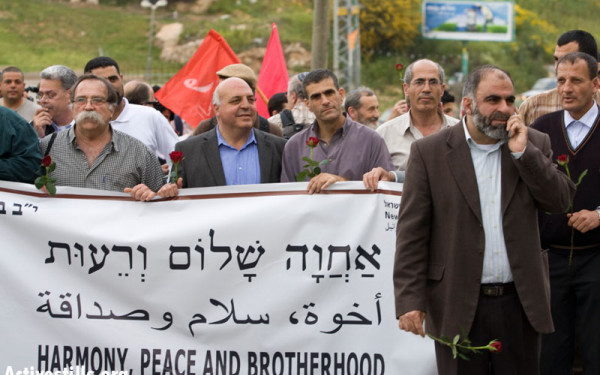A Land Apart
Why Israeli Apartheid Week Is No Misnomer
Israeli Apartheid Week aims to raise awareness about the nature of Israel as an apartheid state and give people the tools to put their education into action via the global Palestinian-lead Boycott, Divestment and Sanctions movement.
IAW, which began in 2005, is an annual series of events organized by a coalition of social justice groups held in cities and campuses across the globe. Last year’s IAW had as many as 97 cities worldwide that participated.
Israel is not the only country that has practiced apartheid. The term ‘apartheid’ derives from the Afrikaans word for apartness. The term apartheid was initially used for South Africa based on its system of racial segregation and legal discrimination.
IAW is about raising awareness of Israel’s system of apartness or segregation between Palestinians and Israelis.
The first description of Israel as an apartheid state came in 1963 from Dr. Hendrik Verwoerd—the South African prime minister who implemented the apartheid system.
There are many similarities between the treatment of blacks in South Africa and that of Palestinians in Israel; the segregated roads and settlements, unequal rights, restriction of movement and the ID cards and permits required to travel even short distances are but a few examples.
South Africa was criticized for its “Bantustan” regions for blacks that only took up 13 per cent of land even though whites were the minority. Palestinians in the West Bank are also placed in “Bantustans”—they live on 12 per cent of their original territory.
Critics of Israeli Apartheid Week stress the differences between South Africa and Israel. Of course, the situations are not identical. In fact, Israeli Apartheid appears to be more catastrophic—or at least, that is what the former South African Minister of Intelligence Services, Ronnie Kasrils, believed:
“The [Israeli] occupation reminds me of the darkest days of apartheid, but we never saw tanks and planes firing at a civilian population. It’s a monstrousness I’d never seen before,” he said. “The wall you built, the checkpoints and the roads for Jews only—it turns the stomach, even for someone who grew up under apartheid. It’s a hundred times worse.”
When you have a political system that favours one ethnic or religious group over others, and these ethnic or religious groups live in separate regions at the same time, that is apartheid. Israel’s family reunification law—which prevents reunification of Palestinian citizens of Israel with family members living in West Bank and Gaza—is also an example of this.
The reality is that Palestinians, even those that live within Israeli territory, do not enjoy the same privileges as Israelis.
Organizers of IAW draw their analysis based on the United Nations definition from the 1973 International Convention on the Suppression of Apartheid and the 2002 Rome Statute of the International Criminal Court. They both outline clearly in what ways a state can be guilty of apartheid.
Unfortunately, it is no exaggeration that Israel is an apartheid state, and that the most proven way to fight apartheid has been via a global non-violent campaign of pre sure and isolation that changes the political condition in which apartheid is allowed to exist. The Boycott, Divestment and San tions campaign works to these ends.
Montreal’s IAW will occur from March 5 to the 13. It will feature speakers such as Frank Barat, who will discuss the Russell Tribunal, the Vietnam and South America tribunal of the ‘70s and the Palestine tribunal that took place in Cape Town in 2009.
The week will also shed light on the oppression and struggles of others, that of the Syrian resistance and of systemic violence against First Nations women.
IAW is about seeking justice and equality, irrespective of ethnicity, religion or race. It is about raising awareness about a system of oppression and to giving people the tools to work in solidarity all around the world with Palestinians fighting against Israeli apartheid.

_900_600_90.jpg)



_600_375_90_s_c1.jpg)
_600_375_90_s_c1.jpg)
